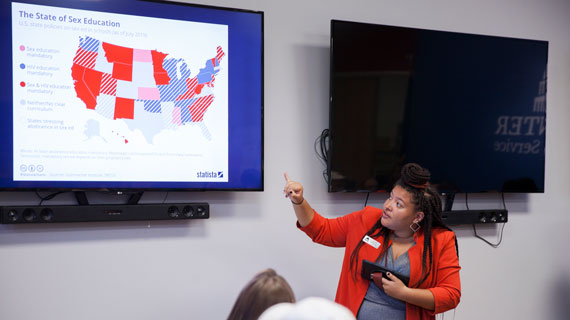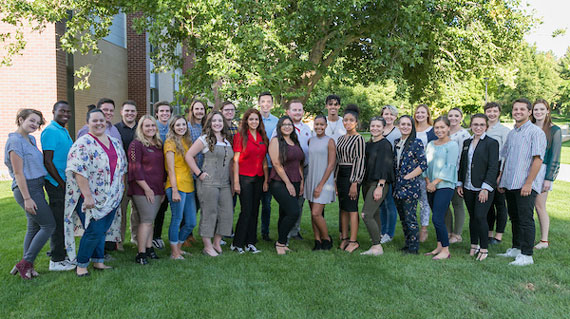Pizza and Politics Presents Sex Education
Posted: September 20, 2019 | Author: Tiago Rodrigues da Costa | Read Time: 3 minutes
 The second week of the Michael O. Leavitt Center for Politics and Public Service’s Pizza and Politics series featured a discussion on sex education, moderated by Jayda Walton and Savannah Robinson, members of the Leavitt Center’s Executive Council. Over 80 students gathered in the Leavitt Center to know more, or broaden their minds, on the topic of sex education.
The second week of the Michael O. Leavitt Center for Politics and Public Service’s Pizza and Politics series featured a discussion on sex education, moderated by Jayda Walton and Savannah Robinson, members of the Leavitt Center’s Executive Council. Over 80 students gathered in the Leavitt Center to know more, or broaden their minds, on the topic of sex education.
“Utah has some of the lowest rates of sex education,” Walton said. “Since we are all students in Utah, and a lot of us grew up here, it’s a good conversation to have.”
The discussion started with an explanation of the differences between a more progressive and more conservative approach to sex education. Comprehensive Sex Education is positive toward sexual relationships and educates on healthy relationships, pregnancy and birth, sexually transmitted diseases, contraceptives options, and sexual orientation. Abstinence-Only Sex Education is a more conservative approach, which according to the moderators, teaches that abstinence from sex is the safest way for youth to avoid STIs and unwanted pregnancies.
“Sex education is a public health matter,” Robinson said. “If we educate people about this public health matter—the spread of STIs, STDs, pregnancy and everything that goes under that—it will keep the community safer. And I feel we need to reinforce the idea that it’s ok to talk about sex, because in the long run, it will affect everyone you know.”
Not everyone in the United States has the same opinion about sex education. Among all the states, only 24 and Washington D.C. require sex education programs, while 37 states support information on abstinence. California is the only state to require consent education within sex education programs, and only 13 states require information to be medically accurate.
The third approach to sex education challenged students and it was unexpected in the room. The Sex-Positive and Pleasure-Based Sex Education Program is meant to help young people have a “healthy, safe and fun sex life,” with proper information about birth control, protection, and both male and female anatomy.
“I wasn’t aware of the pleasure-based sex education that people were discussing,” said student Colby Meline, a double major in philosophy and economics. “My initial reaction was to be against it, because I think it’s an inappropriate thing for teachers to be telling students. However, after referencing the pornography issue and so many kids looking to pornography to find how to actually have pleasurable sex… that really sets up bad expectations and can cause unhealthy relationships to form. So, I think that maybe we should be open to pleasure-based sex education in the future, to try to help people to be more aware of the reality that is going on.”
The debate continued and topics like pornography and parental permission to obtain prescriptions for birth control were brought to the conversation. Pornography is the type of topic that puts more people in a common ground. That is, the majority of people agree it’s negative in the long-term. While permission to obtain prescriptions for birth control divided the room a little bit. However, the majority of the room agreed that sex education is crucial for students’ life.
“I think sex education is extremely important,” said Student Body President Jeff Carr. “I think it’s important in a way that comprehensive education is important to every individual, and in the same way, it’s very important because it concerns a lot of aspects of people’s lives, and health and the prevention of diseases. And it’s something that can be extremely helpful to someone or extremely detrimental, depending on how the education is or isn’t presented.”
The Michael O. Leavitt Center for Politics and Public Service hosts Pizza & Politics every Wednesday at noon to discuss a current political topic. Leavitt Center student employees research the topic and moderate the conversation. These discussions expose students to a variety of important issues and encourage them to share their own perspectives while learning all sides of an issue. Free pizza is provided for all who attend.
Next week’s Pizza and Politics will focus on religious freedom and will be presented by Tom Cloward and Kiely Penman.
This article was published more than 3 years ago and might contain outdated information or broken links. As a result, its accuracy cannot be guaranteed.
Tags: Leavitt Center



